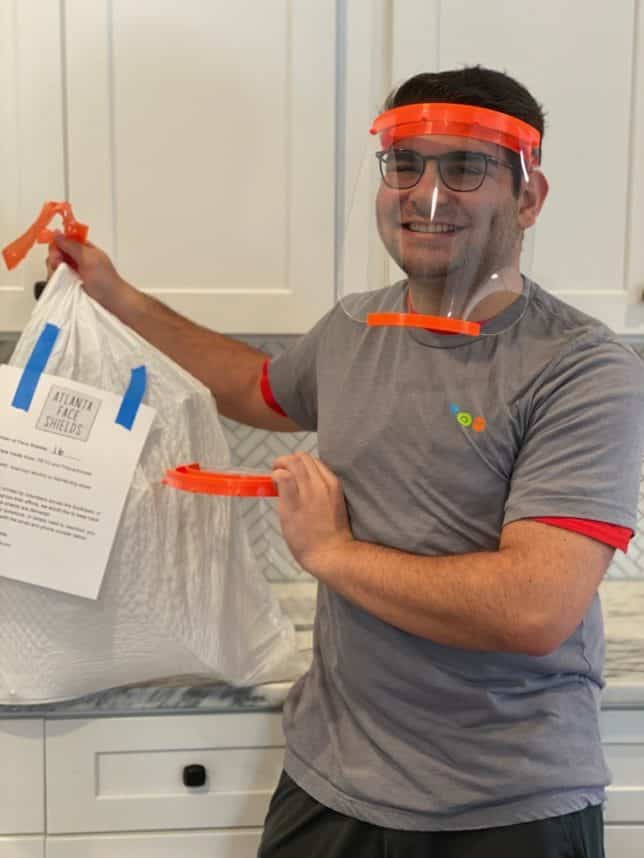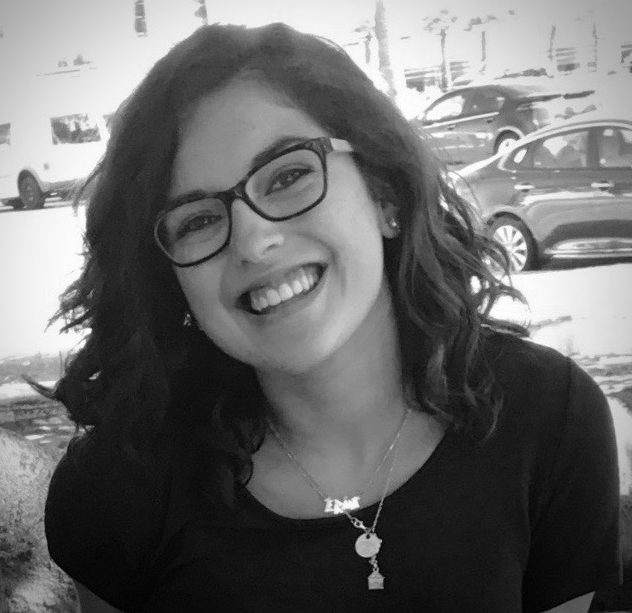 Delivery of 400 face shields made for the WIZO Senior Care Center in Tel Aviv. Photo Courtesy of TOM – Tikkun Olam Makers.
Delivery of 400 face shields made for the WIZO Senior Care Center in Tel Aviv. Photo Courtesy of TOM – Tikkun Olam Makers. Israeli-based non-profit TOM (Tikkun Olam Makers) is one of a myriad of groups providing affordable solutions during the coronavirus pandemic to people living with disabilities, the elderly and the poor.
Founded in 2014, the non-profit organization was designed to help people who were structurally marginalized. Over the years, TOM has established communities in over 22 countries, including the United States. With the outbreak of the coronavirus, TOM decided to refocus its efforts into making specific supplies during the pandemic.
“One of the things we observed is a lot of the focus of people providing solutions has been on hospitals and emergency rooms,” TOM Founder and President Gideon Grinstein told the Journal. “But really there is a whole set of institutions. At TOM we call them second-circle institutions that have acute needs. Homes for the elderly, mental health facilities, jails and so on. Also institutions [that] are taking care of those with disabilities. In these places, a regular face mask may not work.”
TOM communities have designed and curated a list of solutions including various types of face masks, face shields, hands-free door openers, protective gowns, ventilators and hand sanitizer designed for those with disabilities and for essentials workers on the frontlines.
In New York City, TOM launched a partnership with Skill Mill NYC in Manhattan, and Rodeph Sholom School to print personal protective equipment (PPE) for local hospitals and health facilities. As of April 20, 100 face shields had been delivered to The New Jewish Home in New York’s Upper West Side and Mount Sinai East hospital. In Atlanta, TOM partnered with Atlanta Face Shield, led by TOM Northeastern Community Manager Max Seidel, to manufacture and distribute face shields for hospitals in Georgia. To date, they have manufactured 4,000 face shields and raised over $9,000 to fund their costs. In Miami Beach, TOM: Florida International University has completed the manufacturing of 1,000 face shields, which will be distributed to Baptist First South Florida, a health care network with seven hospitals in the Miami area.

In order to make their resources easily accessible around the country, TOM has built an online library of COVID-19 Solutions, and launched a plan for local governments to use and modify for their specific communities.
TOM communities use 3-D printers (on Amazon they run $300 US dollars) so they can manufacture as many products as needed, which then go directly to the community without having to deal with mail carriers. “The only way to address the need in an affordable manner is with local 3-D printers,” Grinstein said. “The software that allows us to design products, to deliver [them] to communities, is essential.”
He added, with TOM communities in 22 countries including Israel, Singapore, Kazakhstan, Greece and the United States, with a click of a button blueprints can be sent to local communities where they can then mass-produce COVID-19 supplies.
One of TOM’s first projects was designing the PJ Prosthesis Violin Module — that enabled an Israeli violinist born without her left arm to play bowed string instruments. The device costs less than $60. By comparison, a typical hand prosthesis can cost from $5,000 to $50,000.
Grinstein noted that while many of their inventions are original, sometimes the only difference between their prototype and a competitor’s is the price. “Anybody can go to the website, download the design and create their own prosthesis [using a 3-D printer] at a local school, a university, a local maker space and so on,” he said.
To date, TOM has more than 1,000 volunteers; has created 14 COVID-19 products with 25 available prototypes; 28,276 total units have been delivered by TOM communities since April 1; and 10,271 units are currently in production.
Home base for TOM will always be in Israel but the humanitarian venture has become global with the use of social media primarily on Facebook, Instagram and Twitter. Social media are also where the organization learns that a new city or country needs a TOM community.
With positive communication on social media and societal changes as whole to include people with disabilities, Grinstein said nonetheless TOM still sees pushback from certain countries that don’t want to acknowledge second-circle institutions in their plans. He said some countries still see it as a source of shame rather than going public and making a difference. He added the only way a community can thrive is if “healthy abled people are interacting with people with disabilities on an equal footing.”
Grinstein noted that each new innovation starts with a “need knower” who has a specific need that has to be fulfilled by a TOM product.
“We say to peers all around the world, ‘Find your need knower. Find a person that has a real need.’ Then around them build a team of innovators, engineers, programmers, product designers that can work with the need knower to develop the product. Find the need, call up the talent, bring them together and let them engage. This is the secret sauce.”
Grinstein said pivoting in times of crisis can be hard for all types of businesses. But like TOM, organizations need to change the way they do things in order to stay relevant.
“You have to have a team that is very cohesive, a team that has shared values otherwise it is very difficult to make these pivots,” he said. “Now especially when we are doing it from a distance. We are lucky to have a team in place and a shared comprehension of our mission and our purpose.”
CORRECTION: TOM is a 501(c)(3) not for profit organization. An earlier version of this story implied they were a company.























 More news and opinions than at a Shabbat dinner, right in your inbox.
More news and opinions than at a Shabbat dinner, right in your inbox.